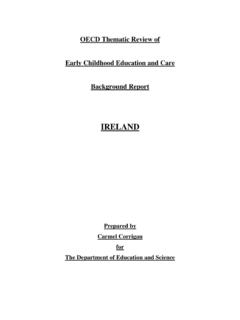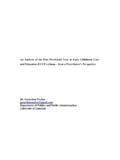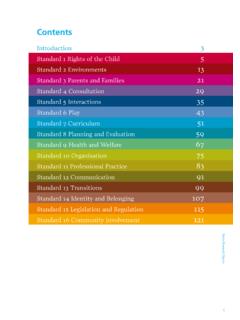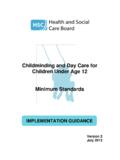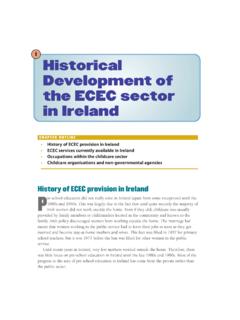Transcription of OECD Country Note Early Childhood Education and …
1 OECD Country NoteEarly Childhood Education and Care Policyin theUnited KingdomDecember 2000 The United Kingdom has granted the OECD permission to include this document on the OECD InternetHome Page. The views expressed in the document are those of the authors and not necessarily those of theUnited Kingdom, the OECD or its Member countries. The copyright conditions governing access toinformation on the OECD Home Page are provided at OF CONTENTSCHAPTER 1: of the OECD Thematic United Kingdom s participation in the review ..4 Structure of the report .. 2: CONTEXT OF ECEC IN THE UNITED KINGDOM ..8 Evolution of ECEC in the UK ..8 The State sector ..8 The voluntary and private sector ..9 Demographic background ..10 Labour context and the employment of and the social policy context ..11 Governmental 3: OVERVIEW OF CURRENT ECEC POLICY AND PROVISION IN THE forms of ECEC for children birth to three.
2 14 Provision for children three to care for children three to five ..16 Combined Education and care ..16 Quality assurance and inspection ..17 Staffing: Classifications, qualifications, staff-child ratios, and salaries ..18 Job classifications and qualifications ..18 Ratios and salaries ..19 Curriculum ..20 Family engagement and support ..21 Funding ..22 Data collection, research, and evaluation ..22 Recent policy maternity and parental leave ..24 The Childcare Tax Credit ..24 The National Childcare Strategy ..24 Early Years Development and Childcare Partnerships ..25 Sure Start ..25 The Early Excellence Centres Pilot Programme ..25 Education Action Zones ..28 Health Action approaches to ratios, staffing, qualifications and training ..28 CHAPTER 4: ISSUES RELATING TO POLICY AND PRACTICE ..31 Views of children and families.
3 31 System co-ordination and collaboration ..32 The continuing division between Education and care ..33 The complexity of funding arrangements ..34 The decentralisation of responsibilities ..34 Access and equity ..35 Access to Early years provision ..35 Access to child for children in need of special ..37 Staff training and qualifications ..38 Recruitment, retention, and working conditions ..38 Approaches to Early learning ..39 Quality assurance and 5: a more comprehensive and co-ordinated Early Childhood access to full-time provision for all children ..42 Reconciling work and family staff training and terms of the approaches to Early learning ..44 Supporting a quality assurance and inspection regime that respects diversity ..46 Developing a research agenda that considers alternative paradigms ..46 REFERENCES.
4 48 APPENDIX I: OECD REVIEW TEAM ..51 APPENDIX II: INFORMATION ON THE UNITED KINGDOM BACKGROUND III: PROGRAMME OF THE REVIEW VISIT ..554 CHAPTER 1: INTRODUCTIONP urposes of the OECD Thematic Country Note for the United Kingdom is an output of the OECDT hematic Review of EarlyChildhood Education and Care Policy,a project launched by the OECD s Education Committee in March1998. The impetus for the project came from the 1996 Ministerial meeting onMaking Lifelong Learning aReality for their communiqu , the Education Ministers assigned a high priority to the goal ofimproving access and quality in Early Childhood Education , in partnership with families, with the aim ofstrengthening the foundations of lifelong learning (OECD, 1996). The goal is to provide cross-nationalinformation to improve policy-making in Early Childhood Education and care in all OECD United Kingdom is one of twelve countries participating in the review between 1998 and2000.
5 The others are Australia, Belgium (Flemish and French Communities), Czech Republic, Denmark,Finland, Italy, the Netherlands, Norway, Portugal, Sweden, and the United States. These countries providea diverse range of social, economic and political contexts, as well as varied policy approaches toward theeducation and care of young scope of the review covers children from birth to compulsory school age, including thetransition to primary schooling. In order to examine thoroughly what children experience in the first yearsof life, the review has adopted a broad, holistic approach to the study of Early Childhood policy andprovision. Consideration has been given to the roles of families and communities on children's earlylearning and development. In particular, the Review investigated concerns aboutquality, accessandequitywith an emphasis on policy development in the following areas: regulations; staffing; programme contentand implementation; family engagement and support; and funding and part of the review process, each Country hosts a review team for an intensive case study each Country visit, a short Country Note is written that draws together background materials and thereview team's observations.
6 The present report for the United Kingdom will be one input into the finalOECD Comparative Report that will provide a review and analysis of ECEC ( Early Childhood educationand care) policy in all 12 countries participating in the review. A detailed description of the review'sobjectives, analytical framework, and methodology is provided in OECD (1998).The United Kingdom s participation in the United Kingdom was the eighth Country to be visited in the Review. Prior to the visit, aBackground Report on ECEC policy in the United Kingdom was prepared by researchers at the Centre forResearch in Early Childhood , University College Worcester (Bertram & Pascal, 1999). Guided by acommon framework accepted by all participating countries, the Background Report provides a conciseoverview of the Country context, major issues and concerns, distinctive ECEC policies and provision,innovative approaches, and available evaluation data.
7 The Background Reports are an important output ofthe review process, because they provide a state-of-the-art overview and analysis of policy and provision in5participating countries. Following authorisation by the issuing countries, they will be placed with theCountry Notes on the OECD analysis of the Background Report and other documents, a review team composed of anOECD Secretariat member and three experts with diverse analytic and policy backgrounds (Appendix 1)visited the United Kingdom from 1 to 10 December, 1999. The ten-day visit was co-ordinated by theDepartment for Education and Employment (DfEE). In the course of the visit, the team interviewed manyof the major actors involved in ECEC policy and practice and had the opportunity to observe a number ofexamples of Early Childhood programmes for 0-6 year olds in England and Scotland (Appendix 2).
8 Thereview team focused primarily on England, although the team visited Scotland for one day and had onesession with a representative from the Welsh Office. A representative from Northern Ireland was not ableto attend a scheduled meeting due to political changes underway at the revolved around six main issues: the ECEC context, major policy concerns, and policy responses to address these concerns; the roles of national government, decentralised authorities, and other social partners, and theinstitutional resources devoted to planning and implementation at each level; feasible policy options that are suited to the British context; the impact, coherence and effectiveness of different approaches; innovative policies and practices including their potential for replication; types of data and instruments that exist, or should be developed, in support of ECEC policy-making, research and of the Country Note presents the review team s analyses of key policy issues related to ECEC inthe United Kingdom.
9 It draws upon information provided in the Background Report, formal and informaldiscussions, the observations of the review team, and materials collected during and after the visit. Inaddition to the present introduction which forms Chapter 1, the structure of the report is as follows: Chapter 2:Context of ECEC in the United evolution of ECEC in the UnitedKingdom is described and also the demographic, labour market and social policy contexts. Inaddition, we select for comment some traditional elements of British society and Education togive the reader some understanding of the contextual background for policy-making forchildren. Chapter 3:Overview of current ECEC policy and provision in the United will find here a summary of information provided in theBackground Reportof theUnited Kingdom, supplemented by data from other sources.
10 Because of the brief nature of theoverview, it has been possible to describe only the broad features of the system. Chapter 4:Issues relating to policy and practiceoutlines the more important issues related topolicy and practice in ECEC that were identified by the reviewers in the course of studyingthe British situation. Six issues were chosen for comment: (1) views of children and families;6(2) system co-ordination and collaboration; (3) access and equity; (4) staffing; (5) approachesto Early learning; and (6) quality assurance and inspection. Chapter 5 concluding chapter provides some brief remarks andsuggestions that policy makers in the United Kingdom may wish to consider in theirdiscussions of Early Childhood policy and of the review team would like to thank all those who participated in the review visit inEngland and in Scotland and gave generously of their expertise and time.











